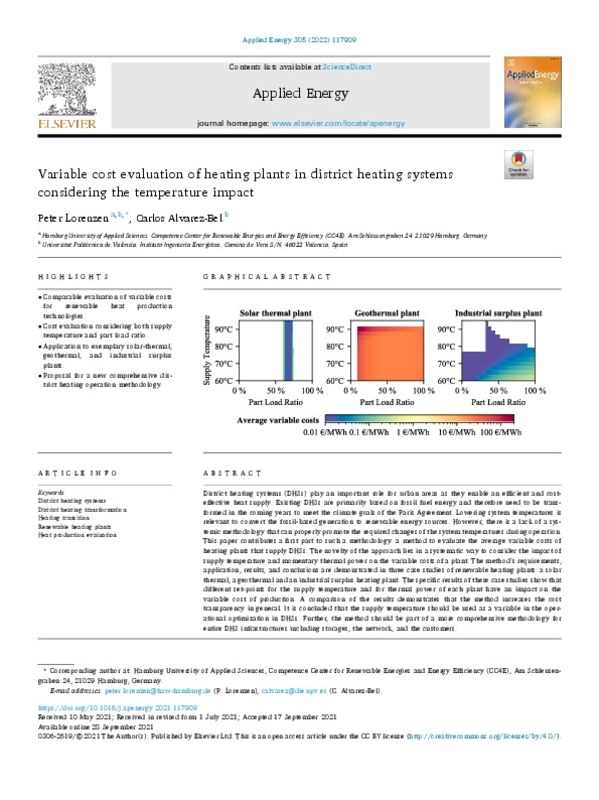JavaScript is disabled for your browser. Some features of this site may not work without it.
Buscar en RiuNet
Listar
Mi cuenta
Estadísticas
Ayuda RiuNet
Admin. UPV
Variable cost evaluation of heating plants in district heating systems considering the temperature impact
Mostrar el registro sencillo del ítem
Ficheros en el ítem
| dc.contributor.author | Lorenzen, Peter
|
es_ES |
| dc.contributor.author | Álvarez, Carlos
|
es_ES |
| dc.date.accessioned | 2022-02-14T19:02:40Z | |
| dc.date.available | 2022-02-14T19:02:40Z | |
| dc.date.issued | 2022-01-01 | es_ES |
| dc.identifier.issn | 0306-2619 | es_ES |
| dc.identifier.uri | http://hdl.handle.net/10251/180798 | |
| dc.description.abstract | [EN] District heating systems (DHSs) play an important role for urban areas as they enable an efficient and cost-effective heat supply. Existing DHSs are primarily based on fossil fuel energy and therefore need to be transformed in the coming years to meet the climate goals of the Paris Agreement. Lowering system temperatures is relevant to convert the fossil-based generation to renewable energy sources. However, there is a lack of a systemic methodology that can properly promote the required changes of the system temperatures during operation. This paper contributes a first part to such a methodology: a method to evaluate the average variable costs of heating plants that supply DHSs. The novelty of the approach lies in a systematic way to consider the impact of supply temperature and momentary thermal power on the variable costs of a plant. The method¿s requirements, application, results, and conclusions are demonstrated in three case studies of renewable heating plants: a solar thermal, a geothermal and an industrial surplus heating plant. The specific results of these case studies show that different set-points for the supply temperature and for thermal power of each plant have an impact on the variable cost of production. A comparison of the results demonstrates that the method increases the cost transparency in general. It is concluded that the supply temperature should be used as a variable in the operational optimization in DHSs. Further, the method should be part of a more comprehensive methodology for entire DHS infrastructures including storages, the network, and the customers. | es_ES |
| dc.description.sponsorship | This work was supported by the Federal Ministry for Economic Af-fairs and Energy of Germany in the project "Smart Heat Grid Hamburg" [grant number 03ET1458A] | es_ES |
| dc.language | Inglés | es_ES |
| dc.publisher | Elsevier | es_ES |
| dc.relation.ispartof | Applied Energy | es_ES |
| dc.rights | Reconocimiento (by) | es_ES |
| dc.subject | District heating systems, District heating transformation | es_ES |
| dc.subject | Heating transition | es_ES |
| dc.subject | Renewable heating plants | es_ES |
| dc.subject | Heat production evaluation | es_ES |
| dc.subject.classification | INGENIERIA ELECTRICA | es_ES |
| dc.title | Variable cost evaluation of heating plants in district heating systems considering the temperature impact | es_ES |
| dc.type | Artículo | es_ES |
| dc.identifier.doi | 10.1016/j.apenergy.2021.117909 | es_ES |
| dc.relation.projectID | info:eu-repo/grantAgreement/BMWI//03ET1458A/ | es_ES |
| dc.rights.accessRights | Abierto | es_ES |
| dc.contributor.affiliation | Universitat Politècnica de València. Departamento de Ingeniería Eléctrica - Departament d'Enginyeria Elèctrica | es_ES |
| dc.description.bibliographicCitation | Lorenzen, P.; Álvarez, C. (2022). Variable cost evaluation of heating plants in district heating systems considering the temperature impact. Applied Energy. 305:1-14. https://doi.org/10.1016/j.apenergy.2021.117909 | es_ES |
| dc.description.accrualMethod | S | es_ES |
| dc.relation.publisherversion | https://doi.org/10.1016/j.apenergy.2021.117909 | es_ES |
| dc.description.upvformatpinicio | 1 | es_ES |
| dc.description.upvformatpfin | 14 | es_ES |
| dc.type.version | info:eu-repo/semantics/publishedVersion | es_ES |
| dc.description.volume | 305 | es_ES |
| dc.relation.pasarela | S\446453 | es_ES |
| dc.contributor.funder | Bundesministerium für Wirtschaft und Energie, Alemania | es_ES |
| dc.subject.ods | 03.- Garantizar una vida saludable y promover el bienestar para todos y todas en todas las edades | es_ES |
| dc.subject.ods | 07.- Asegurar el acceso a energías asequibles, fiables, sostenibles y modernas para todos | es_ES |
| dc.subject.ods | 09.- Desarrollar infraestructuras resilientes, promover la industrialización inclusiva y sostenible, y fomentar la innovación | es_ES |
| dc.subject.ods | 11.- Conseguir que las ciudades y los asentamientos humanos sean inclusivos, seguros, resilientes y sostenibles | es_ES |
| dc.subject.ods | 13.- Tomar medidas urgentes para combatir el cambio climático y sus efectos | es_ES |








